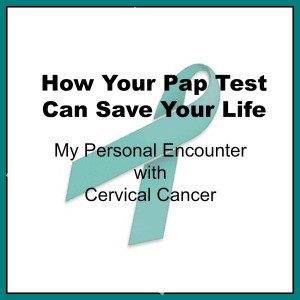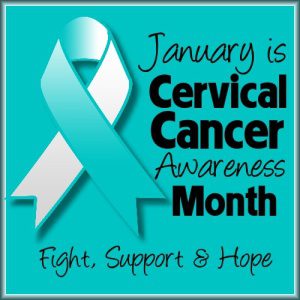
In 2009, I was a healthy 25 year old, 9 weeks pregnant with her first child. During my first exam with my new OB-GYN, I was asked, “When was your last Pap smear?” Back then, the CDC recommended yearly exams for detection of cervical cancer. But, I didn’t have them. I was young, and cancer was a foreign concept. The last exam I had, prior to becoming pregnant, was four years prior. So, there I was, pregnant, and getting an exam. No big deal, right?
Wrong.
My test results were abnormal. I was told to come in for a second test. The result of the second test was also abnormal. I was told it would be addressed at my 12 week appointment in some additional testing.
At the appointment, we were supposed to be excited to hear our baby’s heartbeat for the first time. Instead, my husband and I were told that I had extremely abnormal pre-cancerous cells. So abnormal that—on a scale of one to five (with one being low risk and five being extremely high risk)—I was a 4.5. My doctor told us she was going to open my cervix, spray the cells with iodine, and look at them to see their size, shape, etc. Worst case scenario was that she’d cut some out for pathology. She told us that prying open my cervix during the early stages of pregnancy could cause bleeding, cramping, and even miscarriage, but she felt that we could not wait another 28 weeks because it was THAT serious. When she left the room, the nurse told me that in the twenty years of her career, she’d never seen my doctor remove any cells from anyone during pregnancy, so I should be fine. Then, we finally heard our baby’s heartbeat.
When my doctor came in and began the procedure, she said something I will never forget: “I am going to remove some of these for testing. It’s going to hurt, and I’m sorry.”
I remember what went through my mind:
“That nurse said she’s never seen this happen.”
“I’m going to lose this baby.”
“What am I going to do if I’m pregnant and have cancer?!”
Thankfully, NONE of the cells had turned into cancer, and I didn’t miscarry.
Because my cells were so abnormal, I had to go through the ENTIRE ordeal again at 25 weeks pregnant, just to be sure that pregnancy hormones hadn’t accelerated the growth or development of the cells. Everything was the same—not good, but not worse. At my six week post-partum check-up: yet another test with cell removal. And then, surgery: a LEEP procedure to remove ALL the abnormal tissue in my cervix. After the procedure (done under local anesthesia) my doctor told us that she had to remove far more than what she had expected. The surgery did not come without risk: I now have a higher likelihood of delivering a baby early, as well as a higher chance of infertility or miscarriage. I also had to have pap smears every six months until I had four that were clear. The procedure was successful, and I have been free of abnormal cells since.
These days, the CDC recommends that women between the ages of 21-65, with no history of cancer and no other issues that would put them at higher risk, be screened just every three years, rather than yearly. Studies show that cervical cancer generally takes anywhere from 10-15 years to develop, so experts feel that in low-risk women, every three years is enough.
It took just four years for my cells to go from “normal” to “extremely abnormal,” so I personally cannot stress enough how important it is to have regular screening for cervical cancer. Had I not gotten pregnant when I did, I would have continued to avoid the dreaded pap smear, and that would’ve likely have cost me dearly—possibly my life.
With regular testing, cervical cancer can be found early, which makes it one of the most successfully treatable cancers. Early cervical cancer often has no symptoms, so regular Pap tests are the only way the cancer is detected in its most curable stage. In cases like mine, it can even be prevented entirely, because abnormal cells can be detected and removed BEFORE they turn into cancer. Even still, the American Cancer Society estimated that 12,360 new cases of cervical cancer would be diagnosed in 2014, and of those, 4,020 would die. In the last 30 years, the death rate from cervical cancer has dropped over 50%, because of increased use of the Pap test and more widespread education on the importance of testing.
Please, don’t become a statistic! Make sure you schedule your routine Pap tests. A little bit of discomfort and inconvenience can save your life! (If you’re looking for an OB-GYN in the Nashville area, we have a great list of recommendations to help you start your search.)

















I had regular exams and found out at my postpartum check up that I had precancerous cells. I ended up have a cone biopsy, where they removed a cone shaped portion of my cervix, under anesthesia to remove all the cells. It can happen quickly. I had had a pap just before I had become pregnant and, about one year later, I had developed these cells. I, too, was told that I could run the risk of miscarriage. Thankfully, I was able to have another baby and have had no precancerous cells return. Please get your paps!